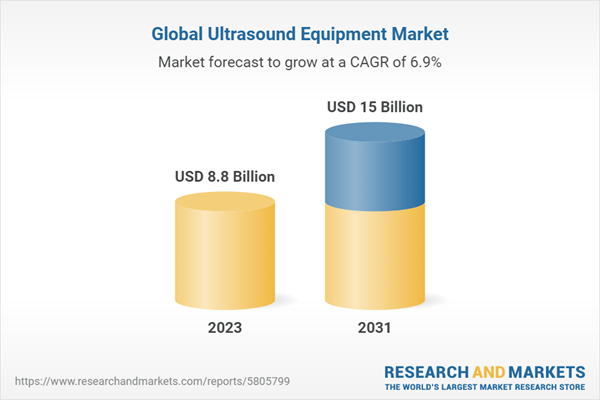Ultrasound Equipment: Introduction
Ultrasound equipment plays a vital role in medical diagnostics by utilizing high-frequency sound waves to create images of internal body structures. It is a non-invasive and widely used imaging modality that provides real-time visualization of organs, tissues, and blood flow. Ultrasound equipment is commonly used across various medical specialties, including obstetrics and gynecology, cardiology, radiology, and emergency medicine.Ultrasound technology offers several advantages, such as its portability, cost-effectiveness, and ability to produce images in real-time. It is commonly used for diagnostic purposes, guiding medical procedures, and monitoring treatment progress. The market for ultrasound equipment has been growing steadily, driven by factors such as the rising prevalence of chronic diseases, technological advancements, increasing healthcare expenditure, and the growing demand for point-of-care diagnostics.
Key Trends in the Ultrasound Equipment Market
Some of the key trends in the ultrasound equipment market are:- Advancements in Technology: The ultrasound equipment market is witnessing significant technological advancements, leading to improved image quality, enhanced diagnostic capabilities, and increased efficiency. Innovations such as 3D and 4D imaging, portable and handheld ultrasound devices, and advanced software algorithms are revolutionizing the field and expanding its applications
- Point-of-Care Ultrasound: Point-of-care ultrasound (POCUS) has emerged as a key trend in recent years. POCUS refers to the use of ultrasound at the bedside by healthcare providers for rapid diagnosis, treatment guidance, and monitoring of patients. The portability and ease of use of modern ultrasound equipment make it an invaluable tool for point-of-care applications, especially in emergency and critical care settings
- Growing Application in Emerging Markets: The demand for ultrasound equipment is rising in emerging markets due to increasing healthcare infrastructure, improving access to medical services, and the need for affordable diagnostic solutions. As healthcare systems in these regions expand, there is a growing focus on investing in ultrasound technology to enhance healthcare delivery and improve patient outcomes
- Artificial Intelligence (AI) Integration: AI and machine learning are being integrated into ultrasound systems to automate and streamline image analysis, improve image interpretation, and assist in diagnosis. AI algorithms can aid in detecting abnormalities, enhancing image quality, and providing decision support to healthcare professionals
Ultrasound Equipment Market Segmentations
Market Breakup by Technology
Diagnostic Ultrasound
- 2D Ultrasound
- 3D and 4D Ultrasound
- Doppler Ultrasound
Therapeutic Ultrasound
- High-Intensity Focused Ultrasound (HIFU)
- Extracorporeal Shockwave Lithotripsy (ESWL)
Market Breakup by Device Display
- Colour Ultrasound
- B/W Ultrasound
Market Breakup by Portability
- Trolley/Cart-based Ultrasound Systems
- Compact/Handheld Ultrasound Systems
- Point-of-care (PoC) Ultrasound Systems
Market Breakup by Application
- Radiology/General Imaging
- Obstetrics/Gynecology
- Cardiology
- Urology
- Vascular
- Orthopedic and Musculoskeletal
- Pain Management
- Others
Market Breakup by End User
- Hospitals, Surgical Centers, and Diagnostic Centers
- Maternity Centers
- Ambulatory Care Centers
- Research and Academics
- Others
Market Breakup by Region
North America
- United States of America
- Canada
Europe
- United Kingdom
- Germany
- France
- Italy
- Others
Asia Pacific
- China
- Japan
- India
- ASEAN
- Australia
- Others
Latin America
- Brazil
- Argentina
- Mexico
- Others
Middle East and Africa
- Saudi Arabia
- United Arab Emirates
- Nigeria
- South Africa
- Others
Ultrasound Equipment Market Scenario
The market is driven by factors such as the rising prevalence of chronic diseases, increasing healthcare expenditure, and advancements in ultrasound technology. The availability of advanced ultrasound systems with improved image quality, enhanced features, and portability has further fuelled market growth. These advancements enable healthcare professionals to obtain high-resolution images, perform detailed examinations, and provide accurate diagnoses.The expanding applications of ultrasound equipment have also contributed to market growth. Besides traditional imaging applications, ultrasound is now being used in emerging areas such as musculoskeletal imaging, vascular imaging, and elastography. Additionally, the integration of artificial intelligence (AI) and machine learning technologies in ultrasound systems has paved the way for automated image analysis, improved diagnostic accuracy, and enhanced workflow efficiency.
Another key trend in the market is the growing adoption of point-of-care ultrasound (POCUS). POCUS enables healthcare providers to perform ultrasound examinations at the patient's bedside, allowing for immediate diagnosis, treatment guidance, and monitoring. The portable and handheld ultrasound devices have gained popularity due to their ease of use, mobility, and ability to deliver real-time results, making them particularly valuable in emergency and critical care settings.
The market for ultrasound equipment is also expanding in emerging markets, driven by the increasing healthcare infrastructure, improving access to medical services, and the need for cost-effective diagnostic solutions. Governments and healthcare organizations in these regions are investing in ultrasound technology to enhance healthcare delivery, particularly in remote and underserved areas.
Ultrasound Equipment Market: Competitor Landscape
The key features of the market report include patent analysis, grants analysis, clinical trials analysis, funding and investment analysis, partnerships, and collaborations analysis by the leading key players. The major companies in the market are as follows:- Koninklijke Philips N.V
- GE Healthcare
- Hitachi, Ltd
- Siemens Healthineers AG
- FUJIFILM Holdings Corporation
- Hologic, Inc
- Canon Medgyn Products, Inc
- Samsung Medison Co., Ltd
- Mindray Medical International Ltd.
Table of Contents
Companies Mentioned
- Koninklijke Philips N.V.
- GE Healthcare
- Hitachi Ltd.
- Siemens Healthineers AG
- FUJIFILM Holdings Corporation
- Hologic Inc.
- Canon Medical Systems Corporation
- Medgyn Products Inc.
Table Information
| Report Attribute | Details |
|---|---|
| No. of Pages | 140 |
| Published | May 2023 |
| Forecast Period | 2023 - 2031 |
| Estimated Market Value ( USD | $ 8.8 Billion |
| Forecasted Market Value ( USD | $ 15 Billion |
| Compound Annual Growth Rate | 6.9% |
| Regions Covered | Global |
| No. of Companies Mentioned | 8 |









